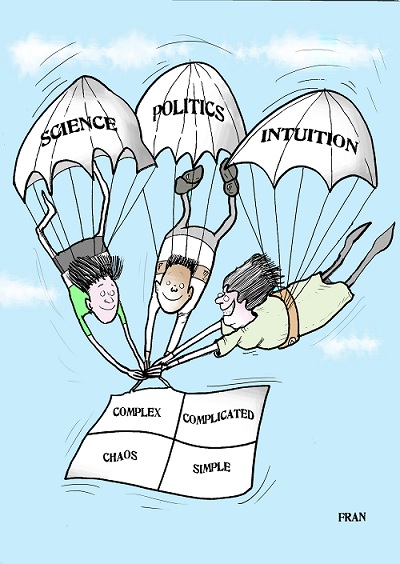Boards need your help
Hand on heart, in the last 25 years has HR moved closer to having strategic boardroom impact? In my opinion, no.
Yes, HR has flourished, developing new tools and insights and becoming a vital partner in operational delivery and corporate change. But so has finance, and look at what hasn’t changed: the disparity between the ‘must-haveness’ of the CFO versus the chief human resources officer (CHRO) in the boardroom.
Yet boards are keen to see if HR has something to say which steps up to today’s business situation. Despite some better economic news, that situation remains one of alarming lack of trust in businesses, with global finance still on central bank life-support.
So here are two research-backed opportunities, one new and one familiar but under-used, which could allow you to speak to your board differently.
Science, politics and intuition
After 18 years in executive search I had a double stroke of luck ‒ the chance to do a management doctorate, and to study the work of sociologist Pierre Bourdieu. One way to understand his analysis of practice is to consider that human activity, especially at the most senior levels in organisations, always involves science, politics and intuition continually struggling with each other. As in the child’s game ‘stone, paper, scissors’, there is no automatic winner.
I develop the research argument in the book Choosing Leaders. But a common sense understanding is enough to suggest how HR could approach the boardroom differently.
For science think beyond lab-coats to the whole idea of trying to be objective, to measure and to understand and predict phenomena using universal laws. Intuition spans everything which arrives in our minds with a ticket stamped ‘I know this but I can’t easily (or at all) explain why.’. This is the whole messy bag of gut feelings, socially and culturally influenced first impressions, advanced expert judgements and values which we find ‘just obvious’. Power and politics means noticing how not only people but ideas and even ‘facts’ always have to struggle for airtime. It includes deeper scrutiny of challenge and conflict – or their absence − in all parts of our workplace (especially our boardrooms).
If we start to unpick how every important business judgement, including the most financial, has its objective, intuitive and political roots, the division of skills into ‘hard’ or ‘soft’ ‒ which has been so unhelpful to HR having strategic impact ‒ starts to drop away. We can also notice how board discussion in which deep intuitions are elicited, heard and appropriately challenged is very different (slower, intimate, vulnerable and time-consuming) from discussion which tries to reach decisions based on the rational processing of objective data.
The first invitation to the board might be: look at your agenda, at what kinds and quantities of information flow to the board and look particularly at the nature of formal and informal discussion, on-site and off-site; then rate separately the scientific, intuitive and political performance of the board (and board members).
Most boards’ inputs and energies are hugely weighted towards science, partly because this is what business schools mostly teach. But it’s not true that a board which is exemplary in its objectivity is somehow doing its work without the impurities of intuition and politics; it’s simply that in such a board, the contribution of intuition and politics is passing without review. Most boards invest in ‘off-sites’ because (intuitively) they know that formal meetings are too restrictive: the science-politics-intuition framework can help the board work out what off-site activities will enhance its thinking rather than be upmarket tourism or entertainment.

Complexity and Cynefin
The scientific advance most relevant to boards over the past 50 years is complexity thinking. Yes, the butterfly causes a storm by flapping its wings. But while this soundbite is famous, what it means for management is barely known. It’s as if we all know Newton was hit on the head by an apple without realising that apples fall downwards at constant acceleration.
Dave Snowden has won awards for making complexity understandable. The Cynefin framework, produced with his colleagues at Cognitive Edge, remains one of the best tools available to help us think better about different kinds of unknowing. The linked video on Dave’s website explains the framework in less than ten minutes. Cynefin distinguishes between domains which are simple, complicated, complex and chaotic, with disorder describing when we don’t know which domain is appropriate. The aims of leadership in each domain are distinct.
Cynefin captures the depths of unpredictability and unknowability. Those are the challenges the butterfly throws at us. For example its complex domain names the possibility that sense can be made of events but only after the event. By contrast many uses of ‘complexity’ cling to the safety of science-like predictability. Thus in ‘VUCA: volatility, uncertainty, complexity and ambiguity’, the action recommended this month in Harvard Business Review for the situation of deepest unknowing (ambiguity) is to learn generalisable rules of cause and effect by experiment (i.e. do science). Does your board use complexity thinking adequately – or at all?
Why should it be HR professionals to raise these issues with the board? The simple answer is that the biggest challenge to confronting unpredictability is deep anxiety, a very human trait. For a deeper answer, think about your favourite airline or your favourite musical show. I like to think about the complex precision manoeuvring of soldiers on parade in London every June marking the Queen’s birthday. Even when human organisations achieve triumphs of predictability – when they most appear to be engineered like clockwork – they can’t be engineered and they are not like clockwork: they are living complexes achieving their results through science, politics and intuition. Whose job is it to know this and its significance for leadership and decision-making, if not HR’s?
A follow-up article in April will extend this discussion into practical steps in doing selection at senior levels. This will yield a new approach in which an ‘HR’ discussion of succession planning and diversity can stimulate a radical, challenging discussion of strategy.








One Response
Right on!
This absoultely sums up my view of where HR is and could be as a leading organisational function. I too have read and endorsed the work of Pierre Bourdieu, and his focus on analysis as the basis for decision-making is powerful and well-argued (see more here – http://bit.ly/1fg1K0m).
I have also focused on reducing complexity in organisations and am currently working with the brains behind SPICE (www.spiceframework.com) to drive a simpler and more robust approach to business strategy and practice.
There are lots of tools, techniques and approaches out there: we just need to find a way of deploying them as HR practitioners.